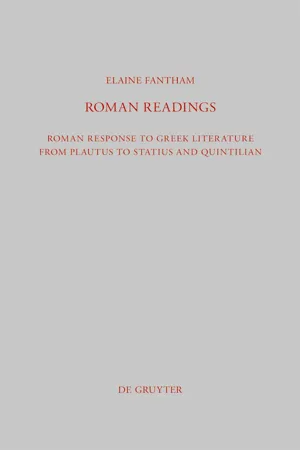
Roman Readings
Roman response to Greek literature from Plautus to Statius and Quintilian
- 661 pages
- English
- PDF
- Available on iOS & Android
Roman Readings
Roman response to Greek literature from Plautus to Statius and Quintilian
About this book
This volume presents closely connected articles by Elaine Fantham, which deal with Roman responses to Greek literature on three major subjects: the history and criticism of Latin poetry and rhetoric, women in Roman life and dramatic poetry and the poetic representation of children in relation to their mothers and teachers. The volume opens with papers on Roman comedy: Menaechmi, Trinummus, Hautontimorumenos, papers on women of the demimonde in Truculentus and Eunuchus, Cistellaria and Poenulus. The second part deals with rhetoric, including the subject of imitation as a stylistic feature, the study of performance comparing oratory and comedy and of declamation. Papers on Ovid's Fasti include a study of failed rape-scenes and papers concerned with women's cults. The last part (Senecan tragedy, Lucan, Statius) focuses on Lucan's Civil War and his treatment of Caesar as well as Statius' Thebaid and Achilleid.
Frequently asked questions
- Essential is ideal for learners and professionals who enjoy exploring a wide range of subjects. Access the Essential Library with 800,000+ trusted titles and best-sellers across business, personal growth, and the humanities. Includes unlimited reading time and Standard Read Aloud voice.
- Complete: Perfect for advanced learners and researchers needing full, unrestricted access. Unlock 1.4M+ books across hundreds of subjects, including academic and specialized titles. The Complete Plan also includes advanced features like Premium Read Aloud and Research Assistant.
Please note we cannot support devices running on iOS 13 and Android 7 or earlier. Learn more about using the app.
Information
Table of contents
- Content
- Introduction
- I Comedy and Sexuality
- II Rhetoric and Literary culture
- III Ovid’s Narrative Poem, the Fasti
- IV Passion and Civil War in Roman Tragedy and Epic: Seneca, Lucan and Statius